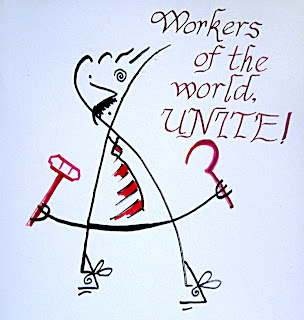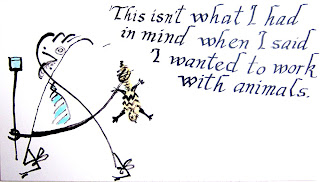
I have a stock response with regard to Ayn Rand: if you haven't read her by the time you're 19, don't bother. (Admittedly, the specific age sometimes changes by a year, plus or minus, depending on my mood - never past twenty, though.) Sometimes I add a second part: if you want to read serious libertarian political philosophy, read Robert Nozick's
Anarchy, State, and Utopia.
As it so happens, I was just teaching a bit on Nozick for my intro class. (A bit of background here: this particular intro class has a broader scope than the average one I've taught, so in addition to epistemology and metaphysics, I also deal with ethics and justice - quite a bit to cram into a single course, but I try to make some of the connections between the topics explicit in a way that I don't remember them being explicit when I was an undergraduate.) The "justice" part of my intro class is framed as, "ethics is how we act individually, justice is how we act corporately" (in a direct parallel to, epistemology is how we gain knowledge individually, philosophy of science is how we gain knowledge corporately). (And for anyone out there who misses this: "corporately" does not necessarily refer to business, it here refers to people acting together - this is the kind of thing my students tend to misunderstand.)
We start with Thrasymachus: might makes right. Socrates dissects the argument (I can go over that in the comments if anyone is really interested, and doesn't already know it). We move then onto Hobbes: life in the state of nature, and the social contract. For me, this is an important transition, because, as with most philosophers who don't specialize in political philosophy (and perhaps some who do, I don't really know, or care), there is a direct connection between Thrasymachus' assumptions and those of Hobbes. We then move from Hobbes to Mill - both empiricists - and then on to John Rawls. What I try to make clear in that transition is that Rawls is fundamentally Kantian in his approach, and I go into some detail about what I mean there (again, I can explain that in the comments, or another post, if readers are interested but unfamiliar).
Then we get to Nozick, and the thing to remember in context is that Nozick is also fundamentally Kantian: that is, he shares some basic assumptions with Rawls, but disagrees on point particular point. He calls this the principle of fairness, but it's a variation on the social contract. Let me say that again: Nozick doesn't like the social contract. I think this is absurd, personally, but at least the connection between Nozick and Ayn Rand is there for all to see. (I then move from Nozick to Adam Smith, to Marx and onto Peter Singer and Amartya Sen, an admittedly biased place to end not only the section on justice, but the course.)
So, last week a student came up and asked me the name of Nozick's book (which he should have known, since it was named in our textbook!), since I had repeated my "don't read Ayn Rand" line while talking about Nozick - and it just so happened that he had started reading Atlas Shrugged the night before (no link, and I suppose I should be glad that he was reading anything, since he obviously hadn't read the assignment for class). I asked him how old he was and he replied, "Nineteen," so I shrugged.
But the more I think about it, the more I just want to say, "If you're not happy with the Social Contract, go visit
Somalia."

















































